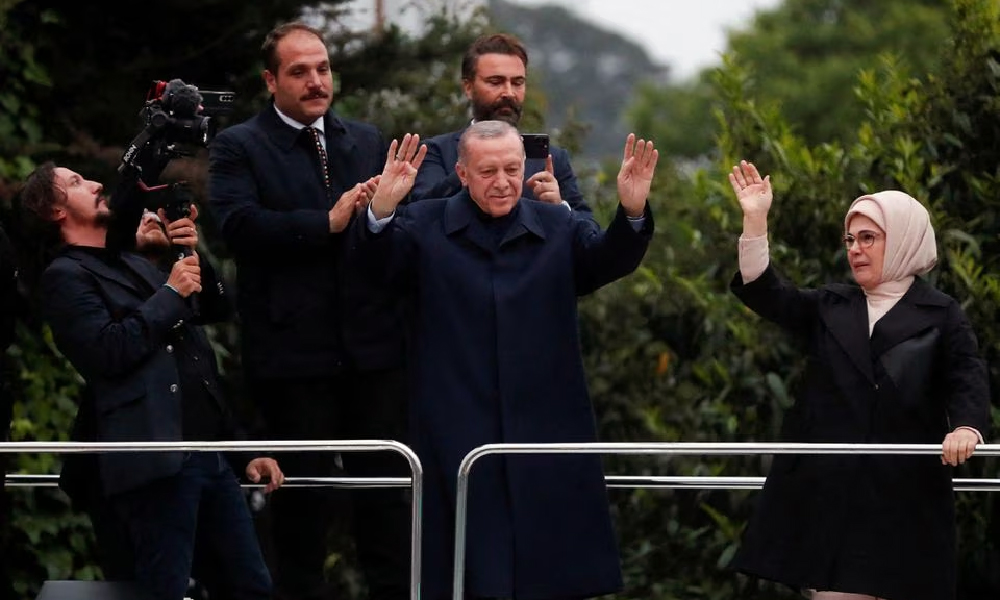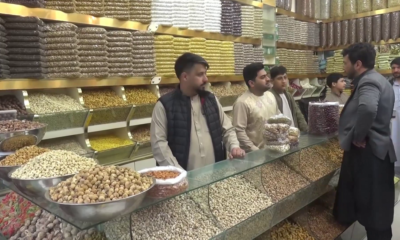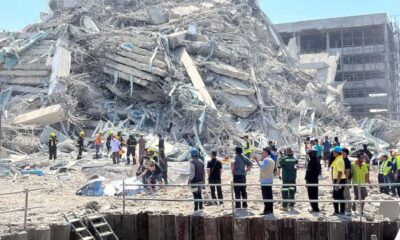World
Turkey’s Erdogan prevails in election test of his 20-year rule

President Tayyip Erdogan extended his two decades in power in elections on Sunday, winning a mandate to pursue increasingly authoritarian policies which have polarised Turkey and strengthened its position as a regional military power, Reuters reported.
His challenger, Kemal Kilicdaroglu, called it “the most unfair election in years” but did not dispute the outcome.
Official results showed Kilicdaroglu won 47.9% of the votes to Erdogan’s 52.1%, pointing to a deeply divided nation.
The election had been seen as one of the most consequential yet for Turkey, with the opposition believing it had a strong chance of unseating Erdogan and reversing his policies after his popularity was hit by a cost-of-living crisis, read the report.
Instead, victory reinforced his image of invincibility, after he had already redrawn domestic, economic, security and foreign policy in the NATO member country of 85 million people.
The prospect of five more years of his rule was a major blow to opponents who accused him of undermining democracy as he amassed ever more power – a charge he denies.
In a victory speech in Ankara, Erdogan pledged to leave all disputes behind and unite behind national values and dreams but then switched gears, lashing out at the opposition and accusing Kilicdaroglu of siding with terrorists without providing evidence, Reuters reported.
He said releasing former pro-Kurdish party leader Selahattin Demirtas, whom he branded a “terrorist,” would not be possible under his governance.
Erdogan said inflation was Turkey’s most urgent issue.
Kilicdaroglu’s defeat will likely be mourned by Turkey’s NATO allies which have been alarmed by Erdogan’s ties to Russian President Vladimir Putin, who congratulated his “dear friend” on his victory, read the report.
U.S. President Joe Biden wrote on Twitter: “I look forward to continuing to work together as NATO Allies on bilateral issues and shared global challenges.”
U.S. relations with Turkey have been impeded by Erdogan’s objection to Sweden joining NATO as well as Ankara’s close relationship with Moscow and differences over Syria.
Addressing jubilant supporters earlier from atop a bus in Istanbul, Erdogan, 69, said “the only winner today is Turkey”. “I thank every single one of our people who once again gave us the responsibility to govern the country five more years,” he said.
Erdogan’s victory extends his tenure as the longest-serving leader since Mustafa Kemal Ataturk established modern Turkey from the ruins of the Ottoman Empire a century ago – a politically potent anniversary to be marked in October with Erdogan in charge.
Erdogan, head of the Islamist-rooted AK Party, appealed to voters with nationalist and conservative rhetoric during a divisive campaign that deflected attention from deep economic troubles.
In his victory speech, he attacked the opposition again, calling them pro-LGBT.
Kilicdaroglu, who had promised to set the country on a more democratic and collaborative path, said the vote showed people’s will to change an authoritarian government. “All the means of the state were laid at the feet of one man,” he said.
Erdogan supporters, who gathered outside his Istanbul residence, chanted Allahu Akbar, or God is Greatest.
“I expect everything to become better,” said Nisa, 28, a headscarved woman wearing a headband with Erdogan’s name.
Another Erdogan supporter said Turkey would get stronger with him in office for five more years.
“There are issues, problems in every country around the world, in European countries as well … With strong leadership we will overcome Turkey’s problems as well,” said the supporter who gave his name as Mert, 39, as he celebrated with his son.
Bugra Oztug, 24, who voted for Kilicdaroglu, blamed the opposition for failing to change. “I feel sad and disappointed but I am not hopeless. I still think there are people who can see the realities and truth,” Oztug said.
Erdogan’s performance has wrong-footed opponents who thought voters would punish him over the state’s initially slow response to devastating earthquakes in February, in which more than 50,000 people died, Reuters reported.
But in the first round of voting on May 14, which included parliamentary elections, his AK Party emerged top in 10 of the 11 provinces hit by the earthquakes, helping it to secure a parliamentary majority along with its allies.
French President Emmanuel Macron offered congratulations, saying France and Turkey had “huge challenges to face together”.
The presidents of Iran, Israel, and the Saudi king were among leaders to congratulate him in the Middle East, where Erdogan has asserted Turkish influence, at times with military power. Erdogan, who was for years at odds with numerous governments in the region, has taken a more conciliatory stance in recent years.
Emre Erdogan, a political science professor at Istanbul’s Bilgi University, attributed Erdogan’s success to his supporters’ belief “in his ability to solve problems, even though he created many of them”.
Erdogan had also maintained the support of conservative voters who long felt marginalised. “This era will be characterized by a decline in political and civil liberties, polarization, and cultural fights between two political tribes,” he said.
Erdogan appeared to have prevailed despite years of economic turmoil which critics blamed on unorthodox economic policies which the opposition had pledged to reverse.
Uncertainty about what an Erdogan win would mean for economic policy pushed the lira to record lows last week, Reuters reported.
Reuters reported last week that there was disagreement within Erdogan’s government over whether to stick with what some called an unsustainable economic programme or to abandon it.
Kilicdaroglu had promised to reset governance, restore human rights, and return independence to the courts and central bank after they were sidelined over the last decade.
World
Israel kills Hezbollah official in deadly Beirut airstrike

An Israeli airstrike killed four people including a Hezbollah official in Beirut’s southern suburbs on Tuesday, a Lebanese security source said, further testing a shaky ceasefire between Israel and Iran-backed Hezbollah.
The Israeli military said the official – Hassan Bdeir – was a member of a Hezbollah unit and Iran’s Quds Force, and he had assisted the Palestinian group Hamas in planning a “significant and imminent terror attack against Israeli civilians,” Reuters reported.
The Lebanese security source said the target was a Hezbollah figure whose responsibilities included the Palestinian file. The Lebanese health ministry said the strike killed four people – including a woman – and wounded seven others.
It marked Israel’s second airstrike in the Hezbollah-controlled suburb of Beirut in five days, adding to strains on the U.S.-brokered ceasefire that ended last year’s devastating conflict.
The attacks on Beirut’s southern suburbs have resumed at a time of broader escalation in the region, with Israel having restarted Gaza strikes after a two-month truce and the United States hitting the Iran-aligned Houthis of Yemen in a bid to get them to stop attacking Red Sea shipping.
Hezbollah lawmaker Ibrahim Moussawi said the Israeli attack amounted to “a major and severe aggression that has escalated the situation to an entirely different level”.
Speaking in a televised statement after visiting the building that was struck, he called on the Lebanese state to “activate the highest level of diplomacy to find solutions”.
Israeli Foreign Minister Gideon Saar said the eliminated Hezbollah operative posed “a real and immediate threat”. “We expect Lebanon to take action to uproot terrorist organizations acting within its borders against Israel,” he said.
Israel dealt severe blows to Hezbollah in the war, killing thousands of its fighters, destroying much of it arsenal and eliminating its top leadership including Hassan Nasrallah.
Hezbollah has denied any role in recent rocket attacks from Lebanon towards Israel, including one that prompted Israel to carry out an airstrike on the southern suburbs last Friday.
Tuesday’s strike in the early hours appeared to have damaged the upper three floors of a building, a Reuters reporter at the scene said, with the balconies of those floors blown out.
The glass on the floors below was intact, indicating a targeted strike. Ambulances were at the scene as families fled to other parts of Beirut.
There was no advance warning, in contrast to the attack on Friday when the Israeli military announced which building it intended to hit and ordered residents to leave the area.
Lebanese President Joseph Aoun condemned the latest airstrike, calling it a “dangerous warning” that signals premeditated intentions against Lebanon, which would intensify diplomatic outreach and mobilise international allies.
Lebanese Prime Minister Nawaf Salam said the strike was a flagrant breach of a U.N. Security Council Resolution upon which the ceasefire was based, and the ceasefire arrangement.
U.S. BACKS ISRAEL
The ceasefire agreement demanded that southern Lebanon be free of Hezbollah fighters and weapons, that Lebanese troops deploy into the area, and that Israeli troops withdraw.
But each side accuses the other of failing to implement the terms fully. Israel says Hezbollah still has infrastructure in the south, while Lebanon and Hezbollah say Israel is occupying Lebanese soil by not withdrawing from five hilltop positions.
The U.S. State Department said that Israel was defending itself from rocket attacks that came from Lebanon and that Washington blamed “terrorists” for the resumption of hostilities.
“Hostilities have resumed because terrorists launched rockets into Israel from Lebanon,” a State Department spokesperson said in an email, responding to a question from Reuters seeking reaction to Tuesday’s airstrike. Washington supported Israel’s response, the spokesperson said.
The Israel-Hezbollah conflict was ignited when Hezbollah opened fire in support of Hamas at the start of the Gaza war. It escalated in September when Israel went on the offensive, declaring the aim of securing the return home of tens of thousands of people evacuated from homes in the north.
The war uprooted more than a million people and killed at least 3,768 people in Lebanon, according to a Lebanese health ministry toll from November. Dozens more have been reported killed by Israeli fire since the ceasefire.
Lebanon’s figures do not distinguish between civilians and fighters.
During the war, Hezbollah strikes killed 45 civilians in northern Israel and the Israeli-occupied Golan Heights. At least 73 Israeli soldiers were killed in northern Israel, the Golan Heights, and in combat in southern Lebanon, according to Israeli authorities.
World
Trump says Zelenskiy wants to back out of critical minerals deal

U.S. President Donald Trump said on Sunday Ukrainian President Volodymyr Zelenskiy wants to back out of a critical minerals deal, warning the Ukrainian leader would face big problems if he did.
“He’s trying to back out of the rare earth deal and if he does that he’s got some problems, big, big problems,” Trump told reporters.
“He wants to be a member of NATO, but he’s never going to be a member of NATO. He understands that.”
(Reuters)
World
South Korea, China, Japan seek regional trade amid Trump tariffs

South Korea, China and Japan held their first economic dialogue in five years on Sunday, seeking to facilitate regional trade as the three Asian export powers brace from U.S. President Donald Trump’s tariffs.
The countries’ three trade ministers agreed to “closely cooperate for a comprehensive and high-level” talks on a South Korea-Japan-China free trade agreement deal to promote “regional and global trade”, according to a statement released after the meeting.
“It is necessary to strengthen the implementation of RCEP, in which all three countries have participated, and to create a framework for expanding trade cooperation among the three countries through Korea-China-Japan FTA negotiations,” said South Korean Trade Minister Ahn Duk-geun, referring to the Regional Comprehensive Economic Partnership.
The ministers met ahead of Trump’s announcement on Wednesday of more tariffs in what he calls “liberation day”, as he upends Washington’s trading partnerships.
Seoul, Beijing and Tokyo are major U.S. major trading partners, although they have been at loggerheads among themselves over issues including territorial disputes and Japan’s release of wastewater from the wrecked Fukushima nuclear power plant.
They have not made substantial progress on a trilateral free-trade deal since starting talks in 2012.
RCEP, which went into force in 2022, is a trade framework among 15 Asia-Pacific countries aimed at lowering trade barriers.
Trump announced 25% import tariffs on cars and auto parts last week, a move that may hurt companies, especially Asian automakers, which are among the largest vehicle exporters to the U.S.
After Mexico, South Korea is the world’s largest exporter of vehicles to the United States, followed by Japan, according to data from S&P.
The ministers agreed to hold their next ministerial meeting in Japan.
(Reuters)
-

 Business5 days ago
Business5 days ago36 mining contracts inked over the past year: Mines ministry
-

 Latest News4 days ago
Latest News4 days agoDried fruit market in Herat booms ahead of Eid-al-Fitr
-

 Regional5 days ago
Regional5 days agoPowerful quake in Southeast Asia kills several, Myanmar declares state of emergency
-

 Latest News5 days ago
Latest News5 days agoUS may ask for military equipment left behind in Afghanistan: Trump
-

 International Sports5 days ago
International Sports5 days agoLucknow’s six-hitting machine Pooran justifies top order slot
-

 Latest News4 days ago
Latest News4 days agoMore than 70,000 Afghans returned home in third week of March: IOM
-

 Health4 days ago
Health4 days agoGlobal organizations warn of health crisis due to aid cuts in Afghanistan
-

 Latest News5 days ago
Latest News5 days agoNegotiations with Afghanistan are the only way forward: Pakistan’s ex-PM Khan
























